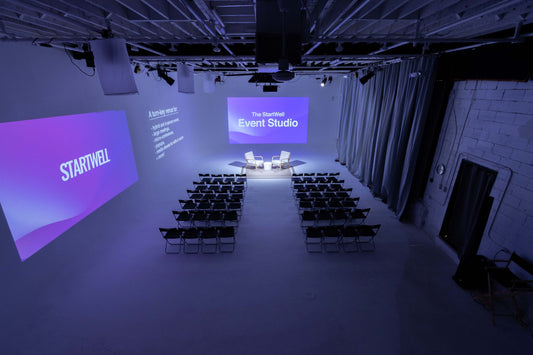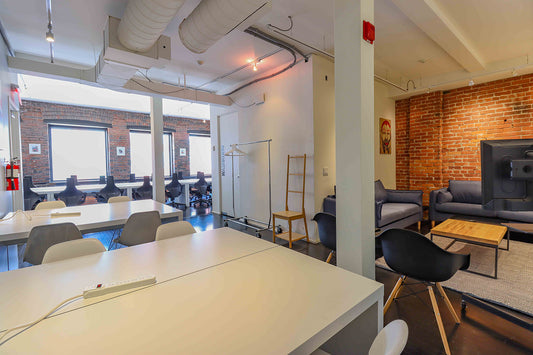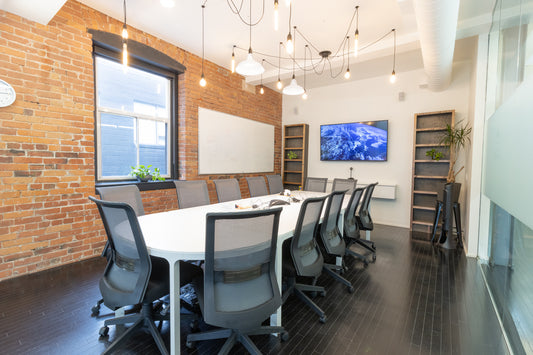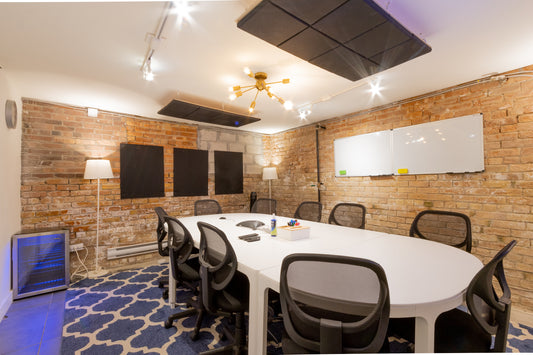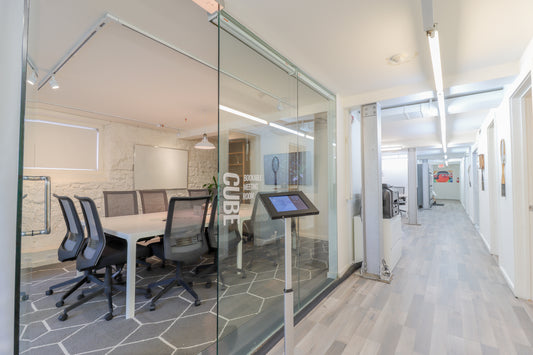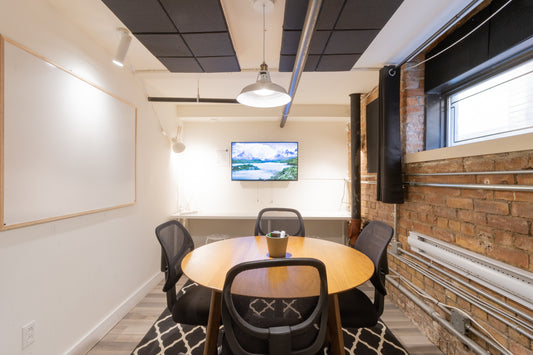Cato Pastoll is the co-founder and CEO of a Toronto based fintech startup called Loop.
Loop bills itself as Canada’s #1 bank for entrepreneurs – with a cross border banking platform that includes corporate cards, payments, FX, capital and more in multiple currencies.
Founded about a decade ago as Lending Loop – the company launched as a platform for equity crowdfunding, before pivoting to focus on how their customers used money in addition to providing ways for them to source it.
In a rush? Here are some highlights from this conversation
- Cross-border banking platform for Canadian businesses. (0:00)
- Banking and international money transfer. (3:06)
- Financial innovation and underserved small businesses in Canada. (6:25)
- Banking regulations and innovation. (11:30)
- Entrepreneurship, financial services, and managing risk. (14:41)
- Loop payment platform for cross-border transactions. (20:09)
- Cross-border payments and currency exchange fees. (23:22)
- Financial management and payment solutions. (29:45)
- Financial management for businesses using Stripe and virtual cards. (32:25)
- Small businesses and their importance in the economy. (37:46)
- Organic growth, customer service, and FinTech innovation. (41:04)
Spend time with this conversation - here's the full transcript
Cato Pastoll 0:00
By looking at the UK, they've come out with new policies and new regulations to enable competition. So they came out with a framework to allow what are referred to as challenge bank. So if you and I wanted to go and start a bank, we could actually do that in the UK. So we could go go over there. I mean, I'm oversimplifying. But we can actually start a bank, you can't really do that in Canada, you need, you know, your million dollars to do that plus.
Qasim Virjee 0:29
Founded in 2017, start well, is Toronto's independent hub for innovators to collaborate, our podcasts relate perspectives from the world's most diverse urban population to reflect unique insights into global business? Media, and culture?
Qasim Virjee 0:51
Okay, Cato, welcome to the start will podcast I'm I'm really excited to talk about a bunch of stuff with you about the history of your company, the evolution of the company, the current incarnation of it, and then the meta on the FinTech world, the world of banking in Canada, and why that's unique. There's so much to talk about. Yeah. And you've been in the game for a little while I have. So first up Cato, introduce yourself, for our listeners that don't know your company loop. Yeah.
Cato Pastoll 1:21
So my name is Kato. As you said, thanks for having me. First of all, I'm excited to be here. Loop is a cross border banking platform. So what we do is we help companies that are based in Canada, but want to expand outside of Canada, so they want to build their businesses around the world do that more easily. So we eliminate the friction from managing your finances across borders, which historically has been very difficult to do. So the world of banking, that's existed for hundreds of years now has been inherently domestic. So you know, when you go to your bank, the Canadian bank is a Canadian bank, and an American bank is an American bank, right? But what we're trying to do is change that notion to say that if you're building a business today, it's now an international business, you know, businesses exist all around the world, you can sell to customers all around the world, a lot of businesses are importing products from all around the world. So why are the financial services that they use, also inherently domestic, they should be international, because that's the way the business is done. So we're trying to kind of recreate a lot of how financial services is shaped by making a platform that allows you to do business internationally, as easy as it is to go to your local branch historically, and over account. So
Qasim Virjee 2:30
let's, let's paint the picture from the behind the scenes, because I think a lot of people who are unfamiliar with the functionings of banks, which really is the majority of people in the world, yeah. We just trust that banks can do stuff, and they won't lose our money. Yeah. But let's, let's paint this picture of kind of like, the thing that you guys, you know, that you mentioned being focused on now, which is this kind of cross border payments, foreign currencies, international business transactions happening under one entity? What right now the pain points with the relying on your domestic bank for these things?
Cato Pastoll 3:06
Yeah, a lot of domestic banks don't have the capability to easily transact internationally. So you know, we can go go down to the foundation of what banks are there, they're effectively a place to put your money. You know, so a lot of people will go and put their deposits, their store their money with a bank, and the bank will then take that money and go lend it out to borrowers. That was like the original idea behind banking. It's why banks were created and why they exist,
Qasim Virjee 3:31
and why they got robbed, like Wild West banking. Yeah, we could spend a lot of time
Cato Pastoll 3:35
talking about that. But because that that, that was the original reason banks were created and why banks exist, yeah, there's a lot of additional supplementary services that people started to need things like credit cards, payments, you know, the ability to easily take money out of your account, or transfer to your family, you know, in other countries in the world, all that stuff was built on top of the original idea behind a bank. Yeah. And so it was very much built in a way that was not conducive to the core of what a bank is actually supposed to do. So the best way to think about it is like the bank's core operation is taking money in and lending it out. It's not moving money around the world. And so there's a lot of friction associated with all those ancillary services that banks offer, because at their core, they're really just designed to take money in and put it out. And so over the last 2030 years, there's been a lot of different service providers who have been created to solve some of the gaps that exists when you're trying to move money around the world when you're trying to pay a vendor, you know, somewhere in Europe, Africa, Asia, you know, when you're trying to send money there, there's lots of service providers who have been trying to solve for that, or when you're
Qasim Virjee 4:43
doing these are b2b service companies, servicing banks, correct or servicing,
Cato Pastoll 4:47
you know, the end enterprise. So like, if you're a large enterprise, they might sell directly to you. An example of a large payments provider like is swift. So as an example, sort of Swift is like a payments network. So So what Swift is is like the underlying network that allows banks to transfer money internationally. So that that is I'm glad you asked that, because that is an example of a legacy and antiquated way of moving money internationally. But that's been the most widely adopted standard, because all the banks use that exact standard for moving money around the world. Right? So you can look at swift and then there's been other people who've tried to create a slightly more efficient way to move money around the world, right? So if we go even more to recent times in the last 1020 years, there's like companies like Payoneer, for example, Payoneer is a large company that effectively mostly services like Amazon businesses, so a lot of Amazon businesses that would need to repatriate their money from wherever their Amazon marketplaces back into their domestic country. So let's say I'm a, you know, a Chinese based at Amazon seller and I'm selling into the US Yeah, what they would do is they would help them collect their money in the United States, send it back to China so that they could basically own that revenue in that country, which their bank, no bank basically allows you to do that. There's no bank that really exists that says like, Okay, your let's go back to Canada. I'm a Canadian business, but I want a bank account in the UK, so I can receive money from my customers in the UK that does not exist in the world today. So that's why there's all these service providers who have been created to kind of solve those problems. Yeah, there's
Qasim Virjee 6:25
so many nuances to this, like the need for evolution, right. And hence, this kind of unfortunate title, you know, segment fintech. But fundamentally, it's really interesting, because I think technology should definitely drive. I guess the protocols around how money is, you know, stored and translated and moved around? Because fundamentally, it's IOUs. Right? Yeah. Right, actually dealing with cash moving around.
Cato Pastoll 6:51
No, for sure. And it's funny, you started talking about technology and banks. When we started getting into this space, I would, I would, when was this? So I've been in financial services for over 10 years, personally, but like loop as a platform that helps companies move money internationally, really started in 2021. So that was kind of the inception behind this idea of can we build an international banking platform? So it's only about a couple years old now. But we've been in financial services since 2014, as a business as lending as running late. Exactly. So we got a different business. No, it's the same company. Yeah. So we've essentially diversified our offering. So originally, maybe I'll take a step back and tell you a little bit about my story. Step back. Yeah. Yeah, I grew up the son of two entrepreneurs, my parents were both business owners, my childcare business for then, my mom was a caterer. So she ran a catering business. She also had a couple of kind of like, local stores as well, where she was like, actually sell sell food products. So I used to work, you know, growing up in that business, I used to work, you know, as a waiter, I used to work in the kitchen. When I became a teenager, I started doing the book. So I've kind of like seen all aspects of what it's like to run a small business through that. And so that experience really shaped my perspective, obviously, on the world, but also on entrepreneurship and building a business. And with not worth it with a kid who had a immense passion for technology and finance, which are really like the two things that for whatever reason, I just like was drawn to technology. I used to build computers as a kid, I taught myself how to program so I could mod video games like that type of stuff. Yeah. The thing that always struck me when I was dealing with the finances of migrants businesses was, it was still done in an incredibly manual offline way, right now, even like in the 2000s, the way that you would transact, we're still manual. And then fast forward to May 2020. I would have conversations with entrepreneurs kind of later on in my journey. And I would say like, yeah, how are you getting paid? And they would say, well, someone's sending me a check paper check and have to go into my bank branch to deposit that check. Right? Like things like that. Or, you know, I'd say, how are you paying your vendors in the US? Well, I've got to use a Canadian credit card, they've got to take my Canadian credit card, they're charging me 3% by banks, charging me another 5% On top of that on foreign exchange fees. So I'm losing 8% On every transaction, and you'd understand the try to understand like, why that's the case. As you kind of dove deeper into this, there those problems? Yeah. And the reason is that, you know, banks have had no incentive to make that better.
Qasim Virjee 9:33
And I think there's like back and this is a classic kind of problem. Maybe I will take a step back, because you're working now in a global arena. So what's your lens on the global landscape? For innovation within finance within banking? Is Canada different than the rest of the world?
Cato Pastoll 9:49
We're very far behind. So you know, he's talking about a little bit about how small businesses have always been underserved. And that's the universe I actually grew up in England. So I'm gonna ask ya isn't built in your accent? Yeah. So my parents, you know, the story I was talking about, you know that their businesses were in London, I grew up there. And the same story is true there. So I think this paradigm of small businesses being underserved is not a uniquely Canadian issue. It's a global issue, where banks have moved continuously up the stream and tried to service larger and larger businesses and in search of profits, and so they've left the smaller people behind. Yeah. And so that's true internationally. But But talking about Canada, where 1015 years behind even the UK, for example, when it comes
Qasim Virjee 10:35
in the UK, who doesn't have electricity? Who
Cato Pastoll 10:40
doesn't have electricity? Yeah, we're quite far behind them. There's several reasons for that. It stems from the way that our banking system is constructed with basically only five players in that space. And it being incredibly difficult for anyone to compete with them because of the regulatory setup and structure that exists within Canada. So you know, we just to give you a couple of examples. When I started in this space, you know, like I said, 2014, was when we started lending lib, people were talking about real time payments coming out in the next two years, we're now coming up on 2024. And they're still no real time payments in Canada. They've had real time payments in the UK, since I don't know the exact year but probably early 2000s. So we're talking like, you know, 20 years later, still no real time payments.
Qasim Virjee 11:30
But isn't that not an aspect of innovation, but more one of regulation in the sense that the banks make money off of holding money. So by collapsing the time that they're holding that money that kind of threatens the leverage that they internally use to make profit? Oh, for sure. I don't find things. Yeah, I
Cato Pastoll 11:49
know that. But it simplification is good. And I think that that really does articulate the point. And in its simplest form, you're right, being as if I was a bank, I also wouldn't want to make it easier for people to move money out of my account, right?
Qasim Virjee 12:03
Not without a good stack of really differentiated products, where you're making money in a hybrid fashion. But like you said, In the beginning, banks are fundamentally core focused.
Cato Pastoll 12:13
Yeah, exactly. You're hitting the nail on the head in terms of understanding why things exist the way that they are, right. And so there has to be an unnatural push to move us out of that. And so like, you're looking at the UK, they've come out with new policies and new regulations to enable competition. So they came out with a framework to allow what are referred to as challenger bank. So if you and I wanted to go and start a bank, we could actually do that in the UK. So we could go go over there. I mean, I'm oversimplifying. But we can actually start a bank, you can't really do that in Canada, you need, you know, your million dollars to do that. Plus, in terms
Qasim Virjee 12:52
of liquidity ratio, like like the whatever you call that recycles the amount that the bank needs to have reserve
Cato Pastoll 12:59
ratios, liquidity ratios, and your it's in terms of that, but it's also in terms of your compliance infrastructure. So one of the big things with financial regulation in general in Canada is we're not particularly good at what's called proportionate regulation. So we basically say like, if you're the largest bank in Canada, RBC, you know, you are going to be regulated under the same scrutiny as a bank that is, you know, 100th of the size of that bank.
Qasim Virjee 13:27
Right. So then that's a competitive barrier for entrance. Yeah. Oh, we got to spend so much money to hire so many people to just fill out forms. Yeah. It's ridiculous. Yeah, as ridiculous because I think we're at a point where societally, the majority of people assume a level of infrastructure and infrastructural justification for the existence of the banks and the monopolies with which they hold, it's like people to treat putting their money in the bank, not that that bank is a they don't think of it as a public company, or a private company or a company. They think of it as some sort of societal infrastructure, like
Cato Pastoll 14:07
the government or something like that, right, like people almost treated in that in that way. And our
Qasim Virjee 14:11
business communities, this was also kind of like a shock wave. You know, I think now this, of course, talking more about the states, but with the recent failures of a couple of the banks like Silicon Valley Bank, a couple of our clients bank was Silicon Valley Bank. And what was interesting was the shock that they had that suddenly their capital, which was really, their startups who got the money from someone else, but like, that money was threatened. And it was like, well, we can't exist without that money, because they had no real way to make money. They had venture backed. Yeah, it's very interesting, because there's only moments like that where people start saying, Hey, wait, you know, like, this is actually not as safeguarded and it's not like we've translated our cash into bullion somewhere and you know, it can't be stolen because to him Have you, for
Cato Pastoll 15:00
sure. And then the simplistic resolution to that is that people say, Oh, I'll move it to a larger bank. Right, like, so that was like the the impulsive reaction, right? You could argue, okay, maybe that makes sense a lot. Your banks are more protected or quote unquote, too big to fail. But I think the real way that you should be looking at as a business owner is like, how do I manage my own risk? You know, when you look at all other aspects of the business, right? If you look at how you're acquiring customers, how you're processing transactions for your business, how you're retaining customers, you don't just rely on a third party and say, like, yeah, you know, like, they're, they're going to take care of it, right? You don't like look at Shopify, for example, and say, I don't even need to know how Shopify works. Like, they're just gonna, you know, yeah, find me customers and run my business. That's not how it works in any other part. But for some reason, and financial services, as you're right, I think we've, we've been trained to be a little bit complacent. And saying, like, you know, I'm just gonna put my money here and trust, it's okay. Now, I think that there is absolutely a need for trust in the financial system. Like we can't have a system where everybody just like, freaking out and running around like it's the Wild West. But I do think that there is a measure to say, as a business owner, as an entrepreneur, put some thought to how you're managing your money where you're managing it. And I think that's ultimately a good thing for the industry. Because I think if people think about that critically, they'll actually move away from big banks, rather than towards them. Which is, which is really what we want, because we want more competitiveness, because that will create better services at the end of the day for small businesses and entrepreneurs.
Qasim Virjee 16:33
Okay, so let's go back to your story. Your mom was good. Or your dad?
Cato Pastoll 16:36
Dentist,
Qasim Virjee 16:37
dentist. Yeah. That's interesting. He's just an entrepreneur, because it's true. But at the same time,
Cato Pastoll 16:44
for sure, well ran his own dental practice, right, I guess that's not working in a practice would be different than running your own one. Yeah.
Qasim Virjee 16:50
Um, and then you're interested in tech and interested in finance. And then so what was the I guess, the initial impetus for creating lending loop? Yeah, so and what was lending loop in its first incarnation,
Cato Pastoll 17:04
I'm glad, I'm glad you went back to the beginning of the story. So as I said, my parents are small business owners. The thing that stuck with me as a child was that when I saw them building their businesses, they had great businesses to me. They, they were profitable, they made money. But they weren't paid work. They enjoyed their work. I mean, it was stressful. But you know, overall, I would say positive, right? But when they were coming home in the evening, I see one more molar. I swear to God, I used to sit there and sometimes in the practice isn't like, you know, look at people's teeth and do that myself. So yeah, I was I was very much like, you know, one of those kids that was very integrated into
Qasim Virjee 17:49
what's happening. Let me help. Let me figure it out. Yeah, great. To
Cato Pastoll 17:54
bet. So they had great businesses. But on the other hand, when they needed access to capital funding to grow their business, it was family in France, there wasn't it wasn't a third party, it wasn't a financial institution stepping in to help, you would go to them. And they would, they would put, you know, you with like an 18 year old, you know, student who would take a look at your business's finances, and then ship it off to a back office team where it would basically never be seen again, called underwriting. Yeah. magicbox. So, that really bothered me, because going back to what is the bank doing? What is the core of a bank, they're supposed to, you know, we just talked about how they don't do any of the other stuff well, but not only do they not do any of the other stuff, well, they don't even do the taking money in and lending money out to people like small businesses as well, right, which is what they were literally created to do, like, that's why banks were created was to essentially create economy, right, like create the ability for people to access capital that wouldn't otherwise be able to access it. So that really bothered me, I thought there has to be a better soul for this. Because if they're not doing their core function somebody else needs to. So the original idea behind our business was what if we could create a way for businesses to more effectively access capital from the people who are putting deposits in the bank from just regular people who want to lend money to those businesses. So that was the idea behind lending loop was basically allowing people like yourself and myself to lend money to companies when they needed access to capital. Through the journey of running that business. We learned a lot, some good lessons, some bad lessons. Ultimately, you know, the problem with just being a lending business, and I think the banks know this, too, and why they've built other services is if you're just a lender, it's a very transactional business, you don't deal the deep customer relationship. Right. And so that's what drove us kind of deeper into the financial services stack to say, how can we support small businesses beyond just access to capital? Right, so we still do help with that. We still have products to enable businesses to get access to funding in capital, but we want it to go down deeper in solving some of the core things that they struggle with every single day in operating their business, so that we could be more of a partner to them versus just a lender.
Qasim Virjee 20:08
So let's talk about that. Okay, so I'll make you repeat yourself a little bit. But what are the main things that loop is being used for?
Cato Pastoll 20:17
Yeah, so I'll give you like a very couple of like, very clever examples. The first one is I'm Canadian business, I sell to customers in the United States, I need a US bank account to be able to have those customers pay me, right now, there's very, very challenging processes to be able to open a bank account in the US that's
Qasim Virjee 20:37
to receive funds, not through visa transactions, or credit card or anything else, it's kind of like Uber, or Lyft.
Cato Pastoll 20:44
Do or even even, you might even be receiving money through like a visa transaction or credit card transaction. But then actually, just getting that money out of your payment processor into a bank might be challenging, right. So let's, let's just use an example. Let's say you're an Amazon seller, right? So I go and I sell on Amazon, I just want to get my US dollar revenue into a US dollar bank account and not lose on the foreign not lose on the Forex, so not have it be converted back to Canadian dollars. And there might be several reasons for that maybe I want to, you know, optimize my Forex, maybe I have expenses in US dollar. So I don't want to convert from USD Canadian and then Canadian back to US dollar. So I just want to earn my US dollar revenue in the US, that is a problem that we sell for. So we basically will say you can come to our platform, you can sign up digitally, you can get us a bank account details. So you can get an account number and a routing number. So when your customer pays you, you give them your loop account details, and that allows you to basically receive that revenue into this domestic bank account. So that's on money in, we can basically help you get paid in how many countries today, we do that in the US, the UK and all of Europe,
Qasim Virjee 21:50
and Canada, and Canada.
Cato Pastoll 21:53
But our focus is interestingly, you know, like I was saying domestic banking, you know, generally works, okay, it's when you start to move money across borders, that people really start to struggle. So our core value prop is on people who are either receiving money in those markets or sending money internationally, right, so we can also send money. So that's, that's money coming in. Now, let's say, you know, I'm buying from a supplier in China, because that's where like, you know, maybe some of the inputs to my product come from Sure, we can also help with that facilitation of the payment going outbound to China, much cheaper, faster and more effectively than if you did that through a bank or another provider. And
Qasim Virjee 22:30
the second example, tell me if this is correct. Credit cards, multiple credit cards, yeah. Virtual credit cards, physical credit cards. Like for example, the use case for us my barista down at front desk, as you know, he needs to buy milk all the time. Yeah. And our regular drop off for the that I get post build for for the espresso company won't do dairy products, you know, they'll drop off the oat. So he needs a card to be able to run across the road or wherever to get the milk from Yep. Easy if I have a loop garden, correct. And a loop card or an account. Tell me about the functioning of the account versus the card. Especially the virtualized ones. Yeah. And how you can move money between them. And think of it differently than just a credit card that's accruing interest. Yeah. Where does the interest go? And how can I sidestep it?
Cato Pastoll 23:21
For sure. So let me kind of explain why we why we created that credit card product. So yeah, that was gonna be I'm glad you brought that up. That was number two. That was number one. A Brian, you want? Yeah, you went? So yeah, number two was is this this multicurrency credit card that we created. So you started to hit on some some of the key several features that are key features that are reasons people use the product. At its core, the big problem that exists with credit cards today, is they are single currency cards. So if you have a card from your bank, that card, if you use in any other currency will convert that transaction into Canadian dollars. On average, the fee that banks charge on that is 5.7%. It's that high. Yeah, that's the average do the currency exchange just on currency exchange? Wow. So that just just to put that in perspective, this ridic, right, if you're a business, and you spend a million dollars on your card in a year, which is reasonable for a business, like some businesses will spend a million dollars, you will lose almost $60,000 Just on card fees. That's it and Outland. So that was like the core problem that we saw solve for originally, because we would talk to the same types of businesses, you know, I'm selling in the US or I'm selling in Europe or the UK. So I'm doing this these cross border transactions. And I also have expenses in those currencies. And when I use my card to pay in those those currencies, my transaction gets converted, I lose a significant portion. So we came out with this idea of like a multi currency card, which basically would allow people to spend money in those different currencies but also pay the balance back in that same currency that you spend not losing on the there's no FX. Wow. So it's funny because there's also you may have heard of these cards called no FX fee cards, like you sometimes see them advertised, like, you know, no FX fees, there's still a two and a half percent fee on the on LFS fee card. It's not for the effects, but it's a service fee. Yeah. So we've taken it from 5.7, down to 2.5%. But you're still actually paying a fee on those cards, because there's, there's all these embedded fees in the transaction, right? So it's very opaque. So
Qasim Virjee 25:29
then how does Luke make money? And what's what's the like? What's the basis of your business model? For sure.
Cato Pastoll 25:34
So yeah, on the cardiologist, just Santa Claus, or Robinhood. So yeah, on the card, for example, what we do, you know, like I said, as you can spend in US dollars and repay in US dollars, so that tying it all together, you have a US dollar account with loop, the US dollar card with loop you use, you get revenue into a US dollar account, you can use that money to pay off your US dollar code, and you've basically eliminated lots of different fees, because you've eliminated the conversion fees of the money coming in, as well as the money going out. So that's about 8% of fees that you've eliminated. How we make money is we say we don't need to make 8% for this to be worthwhile. So we know that if you're earning money in US dollars, and you're a Canadian business, you're probably going to still have foreign exchange associated with your business. But we charge 0.5% instead of charging 8%. So we just charge a much more reasonable fee. And the way we're able to do that is it's all digital. It's all you know, there's no no individual the way that banks are still doing it in most cases is you're actually going into a branch and you're having somebody manually key in your your wire transfer that you're sending. It's an honestly, we've built a platform that allows companies to do that all digitally. So the cost basis of making 0.5% actually makes sense for us as
Qasim Virjee 26:52
Power BI like what what's the point? Is it on a platform? Is it is it through a visa API or something. So
Cato Pastoll 26:58
we've built our own platform. Okay. And essentially, we've plugged into banking networks around the world. And so what's really cool about what we do, Swift is one of them. But we also plug into a lot of local networks. And what's really cool about that is, let's say right, now you want to go send money to someone in the UK. If you went to your bank and did that, that'd be a swift transfer, they would charge you a $50 fee. Yeah, someone would manually enter it, which is very error prone. Like there's a lot of issues with because like, the person might mess up the account details and all this stuff. Yeah. So there's a lot of issues with respect to sending international wire transfers and cost. While we do is, we have your money here in Canada, so you've Canadian dollars with us, you're sending it to somebody in the UK, what we will actually do is we will take your money locally in Canada, move it in the background locally to the UK, and then send it through the local UK payment network. So instead, there's no swift involved in that transaction. We've taken the money from you locally here. We've moved it over to the UK and then sends it locally. Okay,
Qasim Virjee 28:04
then moved it. Are you doing a kind of a like an IOU system? Yes. Like how it was explained to me how zoom used to work? Yes. Or zoom works? Yeah. Tape Bell bought, right.
Cato Pastoll 28:13
It's a similar concept to that for sure. Yeah. Which is like you have a lot of different transactions. And we work with vendors in the background to get volume as well, right. So that, like they're aggregating the volume of not just loop, but also, you know, like, let's say 100 other companies that are doing some type of cross border transaction for some reason. So what happens is, yeah, exactly as what you're getting to, you might be moving money from here to the UK, somebody else is moving money from the UK back to here. So all those transactions offset, and so the actual amount of money that needs to get moved is minimized, because you're kind of creating a market for transacting. Right.
Qasim Virjee 28:48
And that's all digitally calculated in your platform. Yeah,
Cato Pastoll 28:52
I mean, so again, we work with third parties as well on that to some of that, you know, we're transacting on ourselves some of that we're working with third parties on in terms of helping facilitate but what you need to know as I get Luke customer is I click a button and my money gets sent to my customer by my vendor in the UK, instantly through their local payment rail. So in the UK, they have instant payments so we can actually facilitate an instant payment from Canada to the UK through our platform with zero fees with no fees point oh five, well, only if you're exchanging money. So the so that's only the point 5% is only if if you are exchanging from Canadian to British pounds, but let's say you have British pounds with us no fees at all. Like you can basically receive money and send it what are
Qasim Virjee 29:33
the other functions that loop is looking to add in the next little while to the customer experience? Yeah,
Cato Pastoll 29:38
so I mean, I would basically define what we do into four categories. The first category is account. So being able to actually have money stored with us, like using us essentially as a place to store money in Canada, the US the UK, Europe and hopefully more markets in the future. So that's category one. Category Two is accounts receivable. So I mentioned like, you can actually have somebody send money into these accounts. So if your customer wants to pay you, they can put money into your loop account, we also now support the ability for you to pull money from your customers. So let's say you want to lose lose loop to invoice a customer, so you have a customer in the US that owes you, you know, $25,000, because you have a contract with them, and they have to pay you, you know, five out to $2,000 a month, you can actually use loop to collect that money. So we will pull that money from that customer on your behalf as well as a bank to loop transit. Exactly. It's like a bank to bank transaction, much cheaper than a credit card transaction, obviously, which is on like 3%. On average, here, we're talking about, you know, somewhere between kind of 0.1 and 0.5%, as a fee, so much cheaper way to collect money. Yeah, so that's all in accounts receivable, then you've got accounts payable. So that's like, you know, I can see more money coming in accounts payable money going out, right, that would be all the examples we use to mount a credit card is a version of accounts payable, so I'm using a car to pay people, it could also be I'm sending a local payment in Europe, the UK, sending it to somebody in China and Africa and South America, that would all fall in that category of accounts payable. Yeah. So basically, the way to think about that is we want whoever you need to pay, whether it's an a contractor or an employee, somebody who's giving you supplies for your, your, your business, somebody who's selling you inventory, we want to make it as easy to pay them as possible. So you can use our platform to let you click a button and send your your suppliers money through us. And then the last part is foreign exchange. So oftentimes, in the process of receiving money, sending money managing money, you'll need to exchange between your different currencies. And we want to make that possible in the cheapest way imaginable. So we want to make it possible for you to do foreign exchange at a fraction of the cost that it would take, or we charge if if you're using one of the big banks. But
Qasim Virjee 31:53
fundamentally, that should all be for the customer that should ideally be automated. So it's like yeah, just like make it as cheap as possible. For me, I'm not going to think about what accounting is come in. And
Cato Pastoll 32:04
so that'd be amazing. You got it. And we also, you know, so the other big thing that we have started building out is integrations. Right? So integrations into your sales channels, integrations into your accounting system. So if you use QuickBooks Xero, and you want to integrate your loop data without data to make the payment information flow more seamlessly between them, you can do that as well. Nice.
Qasim Virjee 32:25
Yeah, it's pretty integral, especially for EECOM transactions, like we do this on a small scale, but actually a lot of our customers pay us with with Visa. A lot, in fact, so we're that case example that you mentioned this earning like a million dollars on visa transactions a year and paying so much out in fees. Yeah. And we use stripe, yep. For the ease of use and the integration points. But my bookkeeper has a little old school hates it, right, because we get clumps transactions into the account. So he has to backtrack and unpack what that clump is, which is like manual work. You can probably be programmed, but like, yeah, so there's a lot of innovation that can even happen on the Challenger fintechs that are being used already. Totally for this sort of stuff. Yeah. So are you totally stoked to be doing what you're doing?
Cato Pastoll 33:12
Yeah, I love it. I mean, it's, it's very cool to create a product that people use every day. And also to have this goal of helping businesses actually grow, right, like the the most fulfilling part of what we do. As a team, you know, the thing that we get fired up about is like when we see the money that we save a company, and how that allows them to invest in actually growing their business. And so when we see our customers revenue, double or triple in a year, after using our product, that's what gets us really excited. So, you know, I was speaking to a customer yesterday, and you know, they are prospective customer and I was like kind of like a sales call. And they were like, you know, I've had all these requests to use our product in the US, right? Like I'm actually I'm they only currently are in Canada, and they sell to restaurants in Canada. So they're in the restaurant space. And like all these restaurants in the US are actually asking to use our product, but I can't I have no way to do that. Because I can't actually like invoice them or collect that money locally in the US. So your platform is about to unlock a huge revenue opportunity that I just couldn't get access to before because my bank would not that enable me exciting, for sure. Yeah. That
Qasim Virjee 34:21
is exciting. And it's something that I think a lot of people don't think about because we always think of microtransactions and credit card payments. But for anything large no one's gonna pay you like we found that anything larger than $5,000 people will not pay with a credit card, or Sure, or they'll have to juggle to get someone you know, if it's a corporate client, they get the Boss Boss, Boss, boss, super boss has to give his like beautiful black card that has the limit unlocked. But then that's also another side, the flip side, which is what you're facilitating, which is these virtual cards, I think is quite a fascinating accounting mechanism. For sure because you In lieu, I could spin up a card for any account that I want to see transactions clumped into, yeah. And then lock, the availability of credit on that card. Correct also is that virtual card available on an app to like, tap on a payment terminal app
Cato Pastoll 35:18
is coming. So we have, we obviously have physical code. So you can tap that, that on the payment terminal. And then the virtual cards right now, basically, you use for ecommerce transaction. So you can use those cards like to buy on Amazon, for Facebook ads, or any of that type of stuff. So we don't have an actual like mobile app just yet. It's kind of physical and virtual, but to your point. I mean, it is coming. So stay tuned for that. But on the car product, there's a lot of solves there, like you said, like you can use that for team management. So we have a lot of people that will create cards for team members create cards for departments, okay, like I want to create a card for my marketing team I for travel expenses for food to and your bookkeeper will love that, because now they look at the transaction data. And it's all like pre categorized right away, right? So shave their time dialog. So that that's kind of one big solve the other thing you were talking about credit limits, most business owners still use a personal card for their business. And the result of that, there's a lot of complexities that create created and might impact your personal credit and stuff like that. So when you're going to buy a house or whatever, they'll be like, what this car that you're spending, you know, $25,000 on a month, and you I got from my business. So you've got to explain that generally. But even aside from that problem, a lot of personal cards cap out from a limit perspective. So you know, again, I was talking to another customer yesterday, fast growing business, really awesome apparel company, they were paying their credit card off every two days, because they're putting so much spend on their card. And they have to keep paying it and paying it and paying it right.
Qasim Virjee 36:55
And I've even talked to our big bank in the past about saying, Well, what if I just give you a bunch of cash? Like to de risk the availability of credit? Like I'm using my own money now? It's an epic card. Yeah. And they're like, No, we can't we don't work that way. So we will how through you? Am I firstly getting this like multi card thing. They just don't do it. The banks just don't do it, which is a nightmare. And then And then yeah, raising credit limits, like my personal credit limit on my one of my cards is like, six times with the businesses is Yeah. Doesn't make sense whatsoever. Totally.
Cato Pastoll 37:34
Yeah, it's, it's, it's wild that like, still, you know, if you're a small business, or even running a multimillion dollar business, that the way they're setting credit limits for you is based off of your personal credit score. But that's where we are. And it goes, we've kind of repeated on this subject of it. But you know, banks are not focused on solving for that segment. That's that's why we exist, because we want to actually solve for financial services for that segment of the market. So
Qasim Virjee 37:59
do you have a place to work with the banks, at least in Canada,
Cato Pastoll 38:02
we do work with banks, actually. So I guess when I'm talking about this, I'm actually more talking about like the large banks that under service, a lot of the smaller banks exit the non big five banks, credit unions, credit unions, and smaller banks definitely have an appetite and an interest to service this market, but maybe don't have the technology, infrastructure or don't have the reach to actually service them. So we do work with banks today. And actually how our products exist and facilitated is through banks. So we can all be a bank ourselves. I was talking about like in the UK, maybe we could but in Canada, we can't. And so we rely on our bank partnerships to be able to provide the services that we actually offer to customers. But unfortunately, right now, the the largest banks are not interested in partnering on that it's really the kind of the smaller ones. But I think over time, you know, with with regulatory changes and policy changes, hopefully that changes because as more people recognize this is what's good for small businesses and small businesses is what grows our economy. There'll be more of a conscious effort to want to unlock more competition in that space. Yeah,
Qasim Virjee 39:08
no, I mean, even employment, right. This was a stat that came out of the pandemic in 2020. Was that the bulk of Canada's outside of government, the bulk of Canada's employees were employed by small business. Yeah. And then there was all that, you know, the questions around how small businesses were, you know, supported politically through the pandemic, and the crisis of in a way of how we saw a lot of businesses close through the pandemic, just because of a little bit of this, like, yeah, and that they needed and then jobs going away. And then this constant question of like, well, how can you audit accurately unemployment in today's world where employment is for an hour or a day? Yeah, the publicly available government stats are not accurate, you know? So it's very interesting. Yeah, small, small, medium sized businesses really are the the lifeblood of the economy. And the source of of kind of employment at large, I would think, especially as large companies are downscaling, with efficiencies of software and AI and everything. Yeah,
Cato Pastoll 40:17
I mean, the stat 90% of the private sector are employed by small and medium sized businesses. So that STAT again, 90% of the private sector workforce, meaning non government workforce are employed by small and medium sized businesses. So so the largest businesses actually as big as they are only employ 10% of the private sector workforce. So that's easy, but those
Qasim Virjee 40:41
guys make more than us. So you know, they get they get their voices are louder. Yeah, exactly. No one I so I think it's very exciting. And to this note, I have to ask, How is loop reaching customers, at least in Canada? Like, how are you getting in front of all of these SMBs that are no doubt operators are of course concerned with day to day? They're looking for solutions, but they don't know how to procure them? Yeah,
Cato Pastoll 41:04
this podcast. Ya know, we've been fortunate, we really have quite a organic kind of word of mouth type of growth trajectory. Okay, cool. We solve so many of these pain points, like we you know, even in the time we've been talking, we've kind of jumped around from cards to getting paid in other countries to making payments to getting access to capital, right, like those to managing foreign exchange. All of these different things at its core are what banks are supposed to do, but really under service small businesses on. And so the net result of that is we have customers who have really gotten to love our product, nice. And we get a lot of referrals, a lot of business owners, no other business owners, and they tell their friends and their family about our product. And that's really how we've gotten a lot of our growth so far. In our story. Obviously, you know, there are marketing efforts that that we run, mostly kind of through through digital marketing and things like that to kind of drum up some interest or awareness. But by but most of it, you know, that's only a small fraction, nickel, like 10% of where our user bases come from. Most of our user bases come from the organic word of mouth referral type of stuff. And so that's, that's sometimes it's small business owners, but sometimes it's also people like accountants, right? Or agencies who might work with small business owners who use our product and say, Hey, I'm using this great product I'm saving on multicurrency, you know, check it out, or, Hey, can I use Luke to pay you? Because if you use Luke to pay somebody else, and that person also learns about about Luke was right, or vice versa? If you're using lube to invoice your customer, they learned about loop and they might say, Oh, this is really cool. why don't why don't I use it to invoice my customers as well? As seems like a way better solution? Yeah,
Qasim Virjee 42:52
that's brilliant. I always love hearing stories of companies that grow organically that way, because the strength ultimately, of your relationship of your brand relationship with your customers. When it's at the point, that word of mouth is reliable as a means of growing and finding new customers, you know, you're doing the right thing. Yeah. And that's awesome.
Cato Pastoll 43:14
Yeah. And, you know, for me, the customer is why we do it, it's 100. There's no other reason why we exist. And so, you know, from a, we want to be the exact opposite of a bank, when it comes to customer service. There's no like, you know, call through like those call prompts, where you press like eight different buttons, there's no like, get, send us an email and, and we'll reply in two weeks, I will, I will pick up the phone, and I will talk to any customer, you know, directly myself if they need if they need support from me. And that's like the approach and mentality that we have as a business is we are fundamentally different from a customer service and success perspective, then how traditional financial institutions operate. And so, you know, it's here on this podcast, if someone's listening to this, and they want my number, so they can call me about it. When a customer service issue, I'm ready to pick up the phone and have a conversation. And that's fun. You know that that's breaking the cycle of I think how people historically view the way that they interact with financial institutions. Nobody's picking up and picking up the phone and calling the CEO of TD or RBC or BMO, right. He's on the golf course.
Qasim Virjee 44:20
What also on that note, what is the composure of your team? And how does growth look for loop in the next couple of years? Yeah.
Cato Pastoll 44:26
I mean, we're hyper focused on company growth, meaning like the number of companies that we service right now. Sure. So yeah, I mean, we've, like I said, really benefited from a lot of organic growth to date. You know, we're only about kind of a year and a half now, into the journey of actually offering the product that we offer in terms of kind of banking and payments, right, as I said, like the original business was in lending and we've kind of diversified into that. So you know, we're really in that early stage hyper growth mode. You know, we're adding, you know, another five to 10% to our user base every single month, so we're definitely growing quite rapidly. And that's where we're making investment as well as a team. And in terms of, you know, growth and hiring is we want to kind of bring in people to help us get the word out there about loop to make sure that multiple businesses know who we are. Because when people discover us, I'd say it's, it's new from my past, it's one of the easiest products I've ever solved, because the pitches will save you time and money, right, like, either way you win. Yeah, it's a win win solution. The question that people ask me often, I'm finding is like, what's the catch? Right? Like, like, this sounds too good to be true. Like, whatever. The
Qasim Virjee 45:44
snake oil salesman? Yeah.
Cato Pastoll 45:46
So they go salesman, and also, you know, hidden fees with banks, like everyone is used to like, there's some hidden charge here that you're not telling me about, like, what are the hidden charges? Like, I've got to kind of go with a magnifying glass and find it. Yeah. So that that's the focus right now. And yeah, we're definitely just excited about you're getting the word out there and having as many small businesses in Canada, sign up to our product and use us and help those companies unlock their future growth as well. Nice, man. Well, thanks
Qasim Virjee 46:12
for spending time talking with me. It was a pleasure having you in the studio and hearing, you know about the kind of little bit of the foundation, a little bit of kind of like what's going on in the FinTech space through your lens, and where you see the need for innovation for SMBs. And I'm definitely sure a lot of our audience will enjoy this episode. You did say that you'd pick up the phone if they called. So what if there are any kind of like, you know, shout outs that you want to give or context that you want to give to the audience who are looking to learn more about loop or looking to get involved with you guys somehow, for
Cato Pastoll 46:48
sure. Go for it. Yeah, so I mean, our website is get loop.ca. So get loop. And if anyone wants to connect with me directly, check me out on LinkedIn. That's probably the easiest place to find me. So my name is Kato Castile, CA to PHS to double L. So connect me with air and we can definitely jump on a call and chat further. So I'm here and ready to chat with whoever wants to jump right on.
Qasim Virjee 47:14
Thanks, man. It's a pleasure. Thanks for having me.
